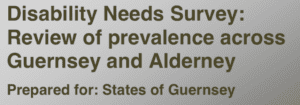Disability Needs Surveys
In November 2011, the States of Guernsey commissioned BMG Research and The University of Nottingham to conduct a programme of research exploring the needs of disabled islanders and the family members and friends who care for them. The research covered Guernsey and Alderney.
In 2011 two surveys were undertaken (Links here)
- The first survey looked at the number of people living with long-term health conditions or disabilities, as well as the number of carers.
- The second survey looked at the experiences of disabled people and people who care for someone with a disability.
The surveys provided information which informed the Disability and Inclusion Strategy.
1st Disability Needs Survey
The first survey looked at the number of people living with long-term health conditions or disabilities, as well as the number of carers.
Link to the survey
Key findings are:
- One in five people (21% Guernsey and 19% Alderney) have a disability; that is, have a long-term condition that affects their day-to-day life. This gives an estimate of 13,742 people with a disability on the islands.
- One in four households (27%) contains at least one person with a disability, and this equates to an estimated 7,352 households across Guernsey and Alderney.
- The prevalence of disability is known to increase with age, hence rates range from 10% for those aged under-16 years to 38% for those aged 67 and over. However, the rates are relatively steady between the ages of 16 and 54, only increasing to 25% for the 55 to 66 age group.
- Overall, the four most common conditions (in order) are: those affecting the legs or feet, the neck or back, heart or blood pressure and mental well-being. The majority (62%) have a medical diagnosis for their condition.
- Individuals may have more than one condition; and three-quarters (74%) are affected by more than one condition. Forty-five per cent of people with a physical condition have a condition that affects their limbs, neck or back, 30% have a condition that affects their hearing, speech or sight, and 36% a condition that affects an internal organ.
-
Most (43%) of those with a long-term condition are in employment – 29% in full-time employment, 12% in part-time employment and 3% in self- employment. Only a small minority (3%) are unemployed and looking for work. A quarter (27%) have retired. A tenth (10%) are in education or training

2nd Disability Needs Survey
The second survey looked at the experiences of disabled people and people who care for someone with a disability.
Link to the survey
The Disability and Inclusion Strategy was created to identify and respond to situations and social conditions which disadvantage or exclude disabled people. It does not have a medical focus – that is, it does not look at people’s conditions or impairments and try to “fix” them.
The second stage involved face-to-face or telephone interviews with around 300 individuals who identified themselves as disabled: either in the course of the first stage research or in the 2012 Housing Needs Survey conducted by the Guernsey Housing Department. Younger people, and people with more significant communication difficulties, were able to have a parent or carer respond to the interview on their behalf. Altogether, 23% of the interviews were completed by parents and carers on behalf of disabled islanders.
Another 100 interviews were conducted with people who care for or support a disabled person. This was limited to “informal” carers – family and friends – rather than professionals or volunteers. These interviews sought to gather information about the experiences of carers in Guernsey and Alderney.
In both cases, the interviews focused on a number of core areas, including: employment, education, accommodation, equipment, social and health care, financial security, accessibility and social participation.
Prepared for: States of Guernsey
Prepared by: BMG Research and the University of Nottingham Date: December 2012




